Dr. Ellana Stinson took a job at Carney Hospital in Dorchester full of passion and pride in what she did: treating a diverse patient population at their most vulnerable medical moments.
But over seven years as an emergency medicine physician at the facility run by financially troubled Steward Health Care, her sense of fulfillment gave way to one of disillusionment.
Now an emergency medicine physician at Boston Medical Center, Stinson said her time working at Carney Hospital and two other facilities in the Steward Health Care system came to be marked by dwindling resources, cuts to specialty services, and patients left in the lurch.
“When I could no longer provide for my patients the way I would want my loved ones, I had to make a decision to stay or go,” she told a U.S. Senate subcommittee on April 3.
The Steward system has come under harsh scrutiny in recent months, including in Massachusetts, where it operates nine hospitals in mostly lower-income communities.
According to public officials and numerous media reports, the for-profit healthcare giant is financially strapped and facing massive debts, endangering the more than 30 hospitals it owns across eight states.
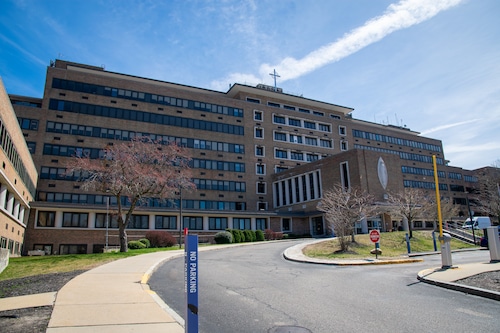
Carney Hospital, a Steward Health Care facility in Boston’s Dorchester neighborhood.Will Katcher/MassLive
Accounts emerge of understaffed Steward emergency rooms and company vendors cutting off deliveries over missed payments. In interviews, some patients said they feared the closure of longtime community medical centers and the loss of affordable and readily accessible healthcare.
“That’s a realistic fear,” Dr. John Freedman, the president of the health policy consulting firm Freedman HealthCare, told MassLive. “I hope it proves to be unfounded.”
Public officials, from U.S. Sen. Elizabeth Warren, D-Mass., to Gov. Maura Healey on down, have accused Steward’s leadership of financial malpractice, bolstered by reports that executives lived lavishly as the healthcare system crumbled.
In February, Democrat Healey demanded Steward provide financial records showing where the company has focused its resources. The governor’s office said the filings, which other healthcare systems have been required to submit, would signal whether the company “chose to put profits over patient care.”
In response, Steward released some, but not all, of the documents Healey sought.
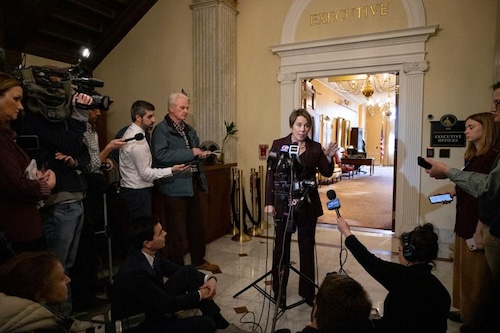
Gov. Maura Healey takes reporters’ questions about the state budget on Feb. 7 at the Statehouse. (SAM DORAN / STATE HOUSE NEWS SERVICE)State House News Service
“The state is in a very difficult position,” Freedman assessed. “It can bail out the hospitals at taxpayer expense. It can force or allow a merger that would further consolidate our already consolidated healthcare system. Or it can allow the facilities to close, with all the pain that brings.”
“None of these are good choices,” he continued. “It’s very difficult to work with an organization that seems to not work in the best interest of its patients.”
Steward Health Care did not respond to MassLive’s requests for comment.
Some patients at Steward hospitals and doctors’ offices are peripherally aware of their medical provider’s shaky financial position, while others anxiously await developments on the company’s future.
Several patients leaving Steward-owned Carney Hospital in Dorchester on a recent afternoon spoke glowingly of their doctors and nurses and the care they received. But many also said they worried about finding alternatives if the medical center closed after decades in Boston’s largest and most diverse neighborhood.
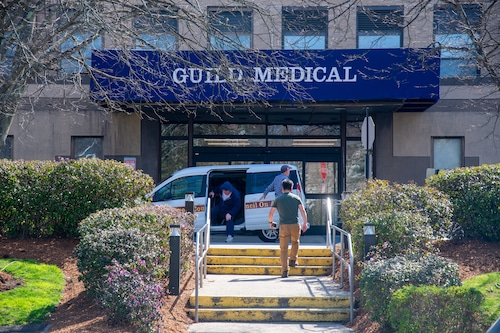
Guild Medical Center, an outpatient facility in Norwood operated by Steward Health Care.Will Katcher/MassLive
Toshiba Loren, of Dorchester, told MassLive she’d been coming to Carney for 50 years. She praised the hospital staff, some of whom she knew by name, and said she was often seen with minimal wait.
Loren called the hospital a “neighborhood institution.”
Asked where she would seek medical care if Carney closed, Loren responded bluntly: “Hell if I know.”
Steward bought Quincy Medical Center in 2011 and closed nearly all its operations in 2014, keeping only the emergency department open under pressure from the state attorney general’s office, according to reports in the Patriot Ledger.
When the company closed the facility for good in late 2020, it left Quincy — population 100,000 — as the state’s largest city without an emergency room.
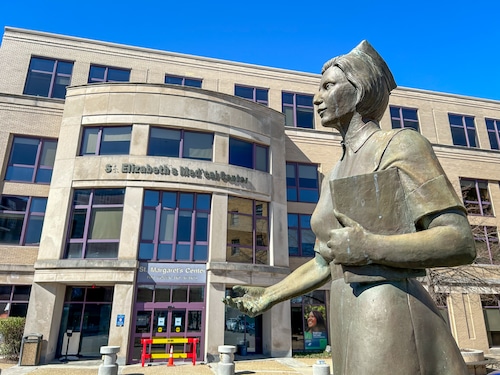
St. Elizabeth’s Medical Center, a Steward Health Care facility in Boston’ Brighton neighborhood.Will Katcher/MassLive
While working at the Quincy hospital, Stinson recalled shortages of blood bags and other essential emergency products, and some periods when vital specialty services, such as respiratory therapy, were unavailable.
The emergency room’s closure was “devastating for that community,” Stinson said. “They didn’t have that easy access to care.”
In Massachusetts, Steward also owns hospitals in Brighton, Fall River, Brockton, Methuen, Haverhill, Taunton, Norwood and Ayer. The system collectively employs thousands of people. About 70% of patients are covered by Medicaid or Medicare, the company told WBUR.
On another recent weekday, patients filtered in and out of Guild Medical Center in Norwood, a Steward outpatient facility across the street from the half-built shell of Norwood Hospital, which Steward also owns.
Catastrophic flooding forced the closure of the 215-bed community hospital in 2020. When Steward announced plans to rebuild the facility, the company promised it would be the area’s first newly constructed hospital in a generation.
Today, Norwood Hospital is a skeletal building frame on a quiet, fenced-off construction site.
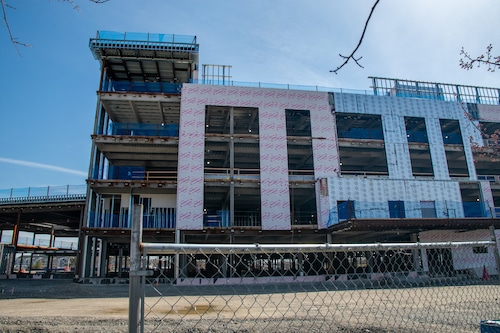
Norwood Hospital, a Steward Health Care facility in Norwood, is being rebuilt after catastrophic flooding damaged the building in 2020. Construction is now paused after contractors said Steward did not pay them. Pictured April 10, 2024.Will Katcher/MassLive
Contractors have stopped work on the project, complaining they haven’t been paid, Democratic U.S. Rep. Stephen Lynch, whose 8th Congressional District includes Norwood, told the Boston Globe in February after touring the worksite.
“Norwood Hospital was my main hospital,” Jim Doherty, of Mansfield, said as he left an appointment at Guild Medical Center on Wednesday. “Now I have to go to Boston or Brockton. Boston, now we’re talking 30 miles.”
Like those at Carney, many patients who spoke with MassLive outside Guild Medical Center also praised their doctors.
Among them was Alejandra Vega, of Norwood, who said she had “no clue” where she would go for medical care if the Norwood facility shuttered.
“I just turned 67. It’s a struggle for me to travel,” she said.
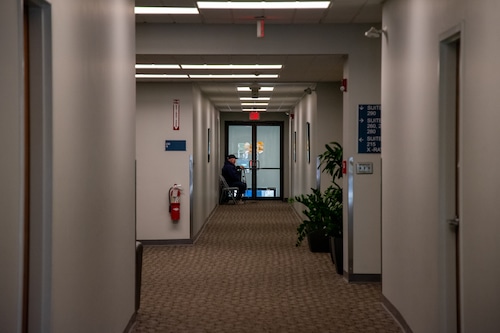
Guild Medical Center, an outpatient facility in Norwood operated by Steward Health Care.Will Katcher/MassLive
Tales from Steward facilities across the country paint a grim picture of the company’s ability to safely provide for patients.
A Wall Street Journal investigation published last month described an infestation of some 3,000 bats at a Steward hospital in Florida. Steward is now battling the pest-control company that dealt with the bats over $1.6 million in allegedly unpaid bills.
Other vendors stopped delivering surgical supplies to Steward facilities, delaying procedures, after claiming the company was delinquent on its payments, the Journal reported.
Part of the company’s debt load can be traced back to a 2016 deal in which Medical Properties Trust, reportedly the nation’s largest hospital real estate owner, bought Steward’s hospital properties and leased them back to the healthcare company.
MPT says Steward is now $50 million behind on rent payments. In a March letter to Steward’s CEO, Dr. Ralph de la Torre, Warren and U.S. Sen. Ed Markey, D-Mass., said the company appears to be hundreds of millions of dollars in debt.
As she and her husband left Carney Hospital on a recent weekday, a woman who identified herself as Valerie told MassLive she was familiar with Steward’s financial struggles, and worried about what might happen if Carney suddenly closed.
“I live in Dorchester. It’s very convenient,” Valerie told MassLive. “We need it to stay open. We don’t want it to close.”
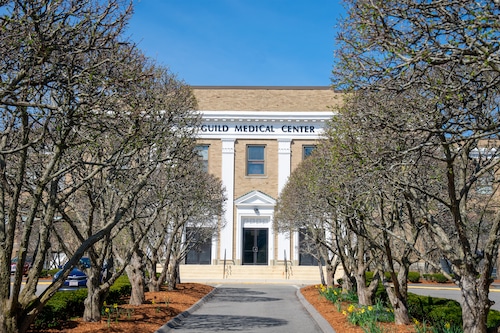
Guild Medical Center, an outpatient facility in Norwood operated by Steward Health Care.Will Katcher/MassLive
Like other hospital patrons who spoke to MassLive, Valerie and her husband Alvin were satisfied with the quality of service they’d received from the hospital.
“They’re very efficient,” Valerie said.
Alvin was also highly critical of the hospital system’s leadership, particularly de la Torre, who has been sharply criticized for maintaining a luxurious lifestyle in contrast to the struggles of the community hospitals he manages.
According to the Boston Globe, de la Torre owns two boats — a 190-foot superyacht to go along with “the most sophisticated sportfish boat ever built” — and travels on two company-owned private jets.
“It doesn’t look good,” Alvin said.
In a letter to de la Torre in February, Healey said the hospital system must ensure that it is appropriately supplied and staffed.
If it could not, she promised the state would “take all actions necessary – in consultation with hospital leadership – to protect patients, including freezing admissions, closing beds, canceling procedures, and transferring patients to other hospitals.”
Healey also called on Steward to release financial reports she said every other healthcare system in the state had disclosed, key to providing a window into the company’s financial outlook. Steward is challenging a court order to release the information.
“You have kept your hospitals’ financial condition in a black box, and you have kept us in the dark as well, defying state law and a court order in the process,” Healey told de la Torre. She said “the time [had] come” for Steward to transfer its hospitals to new owners.
“It’s going to be a challenge for whoever takes over these hospitals to make them viable,” Freedman said. He pointed to the half-finished Norwood Hospital as one unfortunate example.
“Who’s going to pony up the many millions of dollars to finish the construction?” Freedman asked.
Steward reached a deal last month to sell its nationwide physician network to a subsidiary of UnitedHealth, the nation’s largest healthcare conglomerate.
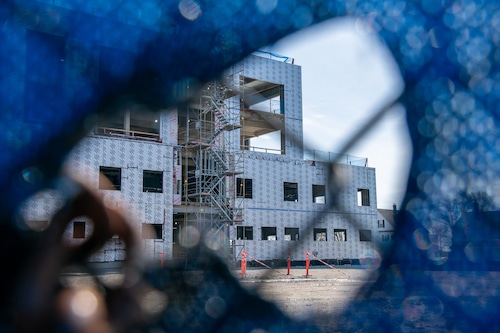
Norwood Hospital, a Steward Health Care facility in Norwood, is being rebuilt after catastrophic flooding damaged the building in 2020. Construction is now paused after contractors said Steward did not pay them. Pictured April 10, 2024.Will Katcher/MassLive
In a joint letter last week to the Federal Trade Commission and Department of Justice, Massachusetts’ 11-member congressional delegation said they worried the deal would further cement UnitedHealth’s “stranglehold” on the healthcare market, driving patient costs higher.
As she left Carney Hospital after an appointment earlier this week, Genie Morehouse, of Dorchester, worried about finding new doctors and securing timely appointments at other facilities if her neighborhood hospital closed.
She had knee surgery at Carney last year. It went well, though some hospital facilities and equipment seemed outdated and needed repair.
“It’s not a bad place, really,” Morehouse said. “But it sucks that it’s happening.”






